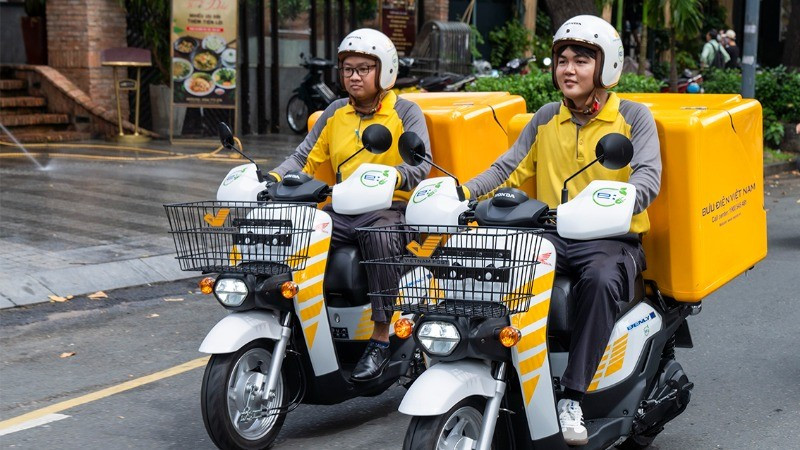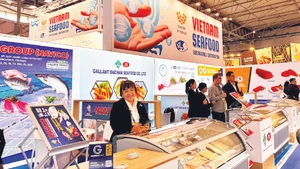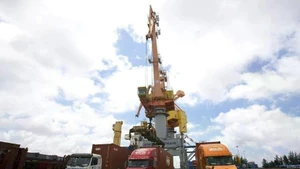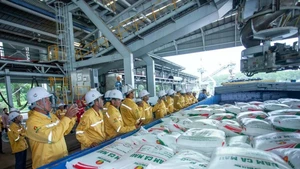Pioneering logistics enterprise in “greening”
As one of the leading companies in Vietnam’s logistics industry, Vietnam Post has implemented numerous initiatives in recent years to "green" its logistics operations.
Specifically, Vietnam Post launched Postgreen Project in 2019 to establish a more environmentally friendly postal system. This initiative includes small yet impactful actions, such as encouraging employees to avoid single-use plastic items in offices, processing centres, and transportation vehicles.
Additionally, the company has promoted the "Green Office" movement, designed open-space post offices to create a friendly environment between customers and staff, and encouraged customers to switch from plastic packaging to standard cardboard boxes. This change ensures both package safety and environmental protection.
Notably, in 2021, driven by a commitment to sustainability, Vietnam Post became the first postal enterprise in Vietnam to collaborate with Honda Vietnam in using electric motorbikes for delivery services.
Through its continuous innovation, service quality improvement, digital transformation, and eco-friendly initiatives, Vietnam Post played a key role in elevating Vietnam’s Postal Development Index from level 5 to level 6, placing the country among those with well-developed postal services.
Vietnam Post has been at the forefront of applying green logistics solutions in its business operations. According to Dao Trong Khoa, Chairman of the Vietnam Logistics Business Association (VLA), climate change is one of the greatest global challenges of the 21st century. The logistics industry alone contributes significantly to carbon emissions, accounting for an estimated 7-8% of global CO2 emissions. This has led to a growing awareness of green logistics among Vietnamese businesses.
“Many enterprises under the Vietnam Logistics Business Association (VLA) have proactively implemented environmentally friendly solutions, such as using low-emission transport vehicles, applying digital technology to optimize routes, reducing fuel consumption, and improving operational efficiency. Some member companies’ seaports have even received 'Green' certifications from international organisations. Meanwhile, others have started conducting carbon emission inventories and participating in the carbon credit market. However, the adoption of green logistics in Vietnam is still at a small scale and not yet widespread. The country remains in the early stages of this transition," Dao Trong Khoa noted.
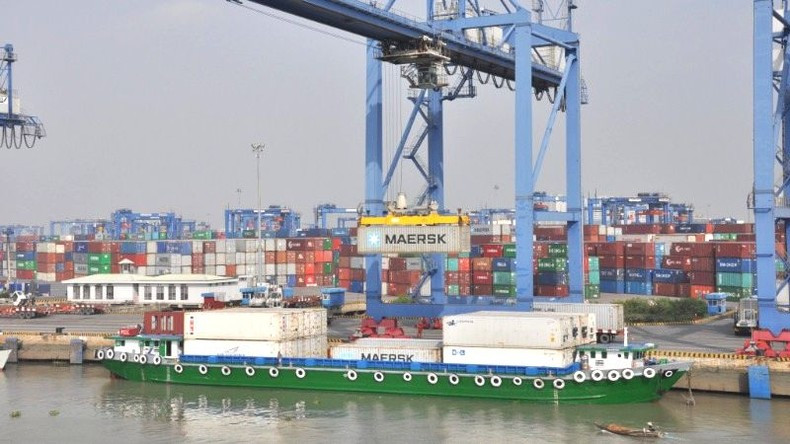 |
| Green transformation will help logistics businesses improve their competitiveness. |
Despite the progress made by pioneering companies, many businesses in Vietnam’s logistics sector have yet to prioritise sustainability. Only a small fraction of the 34,000 logistics enterprises nationwide have taken concrete steps toward green transformation.
A survey conducted by the Vietnam Institute of Logistics Research and Development (VLI) from August 2023 to July 2024 has revealed several concerning realities. While awareness of green logistics has been increasing, most companies have yet to actively implement environmental commitments.
Specifically, 12.5% of logistics firms have not implemented any green policies or sustainable production processes. Meanwhile, 87.5% have been making plans to move towards sustainable solutions.
However, the majority have yet to specify a clear timeline for fulfilling their commitments. Notably, up to 65.63% of logistics service providers have not implemented measures to mitigate environmental impacts, while only 34.37% have either adopted or planned to introduce green solutions.
Meanwhile, Vietnam's logistics sector remains heavily reliant on road transport and lacks balanced development across different modes of transportation. Currently, 75% of goods are transported by road, while 12% go by sea and only 2% by rail. Alarmingly, as much as 95% of vehicles in Vietnam still depend on fossil fuels.
Additionally, e-commerce is booming in Vietnam. Logistics play a crucial role in the e-commerce supply chain, yet freight transport is also a significant source of greenhouse gas emissions and environmental pollution.
Moreover, in the online retail sector, two key processes negatively impact the environment including delivery and packaging. Each product shipped from an online store comes with individual packaging, often including cardboard boxes, plastic bags, foam containers, and single-use plastics.
Every day, thousands of trucks, cars, and motorbikes deliver orders to customers and collect undelivered parcels, generating a massive carbon footprint. These environmental impacts are even more severe in the case of express delivery services.
Solutions for businesses
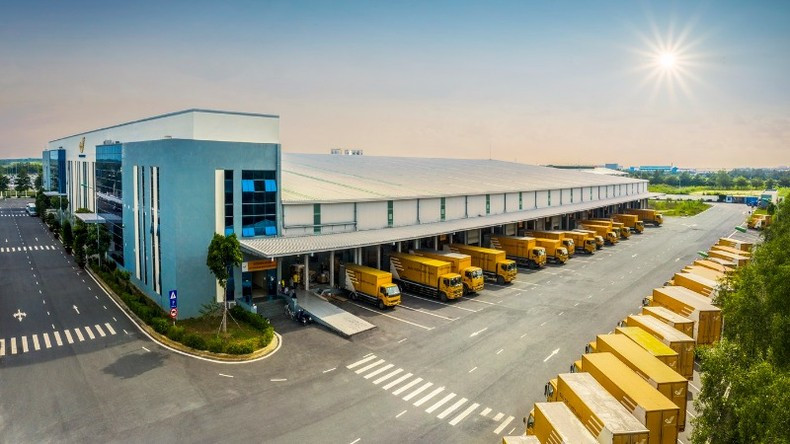 |
| Green transition is an urgent requirement to contribute to achieving the goals set at COP26. |
In the current context, developing green logistics and reducing emissions have become crucial components of any supply chain. This is especially important amid global geopolitical uncertainties and the increasing demand for sustainability efforts to curb emissions worldwide. Vietnam, too, is striving to fulfil its commitment of achieving net-zero emissions by 2050.
Despite its tangible benefits, the transition to green logistics remains a significant challenge for businesses, particularly small and medium-sized enterprises (SMEs).
One major challenge lies in human factors, including awareness and the ability to adapt to sustainable logistics practices. Additionally, Vietnam’s transportation infrastructure remains incomplete, especially in remote areas. Cost is another concern that makes businesses hesitant to adopt green solutions.
Suggesting pathways for a greener logistics sector, Pham Thien An, Director of Vinacontrol Inspection Company, noted that the government has introduced various policies and support mechanisms. Furthermore, the carbon credit market could serve as a valuable financial tool to assist businesses in their green transition efforts.
As such, businesses must develop a well-defined, precise, and strategic roadmap to effectively and swiftly reduce greenhouse gas emissions and achieve optimal carbon reduction.
To this end, companies should invest in green transport technologies, including research and deployment of electric vehicles, hybrid trucks, and fuel-efficient technologies. Additionally, businesses need to transition to multimodal transportation by integrating road, sea, and rail logistics. Digitalising supply chains by investing in advanced technology platforms will also help optimise transport routes.
Moreover, the use of sustainable fuels such as biofuels should be encouraged, in conjunction with strengthening international cooperation and participating in or developing carbon offset projects.
To support logistics service providers in enhancing their competitiveness, Vietnam will host the FIATA World Congress 2025 in October 2025. This major global event will bring together top logistics experts and businesses from around the world.
With the theme "Green and Resilient Logistics", the event will not only reaffirm Vietnam’s strong commitment to sustainable development but also provide opportunities to explore emerging trends, learn from international experiences, and foster industry collaboration.
This congress will serve as a key platform connecting experts and businesses from both domestic and global markets, driving the green transformation of logistics. It aims to enhance competitiveness and contribute to building a more sustainable economy.
